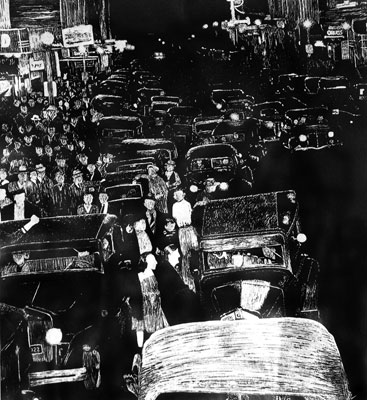All Nonfiction
- Bullying
- Books
- Academic
- Author Interviews
- Celebrity interviews
- College Articles
- College Essays
- Educator of the Year
- Heroes
- Interviews
- Memoir
- Personal Experience
- Sports
- Travel & Culture
All Opinions
- Bullying
- Current Events / Politics
- Discrimination
- Drugs / Alcohol / Smoking
- Entertainment / Celebrities
- Environment
- Love / Relationships
- Movies / Music / TV
- Pop Culture / Trends
- School / College
- Social Issues / Civics
- Spirituality / Religion
- Sports / Hobbies
All Hot Topics
- Bullying
- Community Service
- Environment
- Health
- Letters to the Editor
- Pride & Prejudice
- What Matters
- Back
Summer Guide
- Program Links
- Program Reviews
- Back
College Guide
- College Links
- College Reviews
- College Essays
- College Articles
- Back
Land of the Free, Home of the Considerate
Americans as a whole are a respectful and polite society. This custom of courtesy has been rooted in American culture since the formation of the country when the colonies calmly distanced themselves from their former British ties. You will never see an American being rude on the phone, leaving a small tip, or consciously hurting the environment by driving a large SUV. On the contrary, Americans always hold the door open for people, are health conscious, and respect people who are different. Even if the action requires a little bit of effort, Americans are willing to go above and beyond to make someone else’s day a little bit easier. Americans are aware of their actions and think in advance about how they can affect other people throughout the day.
Driving is no exception to the ways Americans delight in being considerate of others. During the development of cars and automotive safety in the early 20th century, Americans realized that there are other drivers on the road who are more important than themselves. Cars did not reflect the society’s ideals of consideration, so modifications needed to be made to help Americans in their unending quest to provide every person in the country the maximum respect.
In 1898, the first electric headlights were introduced for an automobile. The initial push was not because drivers cared about their individual safety, but because they recognized their existence on the road could be a danger to others, and wanted to remedy this by making their presence known. Since the initial development of the headlight, there have been many regulations by the government, which recognizes what the people want: to give respect on the road. Currently, Americans always use headlights properly. People never forget to turn their lights on at dusk, or to dim their brights when approaching other cars. This behavior shows that Americans are always thinking of others, especially when driving.
Another automotive invention designed to allow Americans to respect others is the turn signal. First appearing in 1907, the craze for turn signals grew quickly. The modern turn signal was patented in 1938 when it became clear that Americans loved this feature on cars for its ease and effectiveness. No longer would people have to turn without notifying those behind them, risk an accident, or cause those behind them to wonder why their speed was rapidly decreasing for a right turn. The importance of turn signals is so deeply instilled in the culture that drivers never forget to put their signals on. Why disrespect other people by turning without a signal? It is simply the courteous thing to do.
Car horns, developed in 1910, are the most difficult tool to master. Designers never could have imagined the internal conflict that Americans would experience when deciding if the horn is appropriate in the situation. For example, if a car is not moving and is holding up the entire line behind it, any considerate person would wish to fix the situation for those behind him or her, whether or not it also helps him or her. And if someone is about to cause a collision, it is rude to assume that they are oblivious to their actions. One should assume that they are aware and will correct themselves when they see fit. But honking a horn is sometimes a necessity, and is a delicate proceeding, because no American would ever want to offend the slow driver by honking too loud, too long, or too early. How long should the horn be held? Should it be a quick tap, or a more meaningful sound? When is the appropriate time to honk? These are the options that must be weighed when a respectful person wishes to alert others with a horn. Of course, Americans never use their horns in inappropriate circumstances, such as to say hello to friends or catch the attention of a cute runner on the sidewalk. That would distract everyone and be very inconsiderate, which is not the purpose of the horn.
Through all of these staples in American life, it is clear that respect is of the utmost importance in the society. Americans know that headlights, turn signals, and car horns are some of the simplest ways to be considerate of others on the road, and therefore never miss an opportunity to properly use them. These tools are just a continuation of the unending list of courteous actions that Americans do for others on a daily basis, such as being extremely polite to servers in restaurants, keeping completely silent in the movie theater, and always following the item limit on express lanes in the grocery store. Americans value others over themselves at all times, and recognize how their actions can so easily affect others in many parts of everyday life. This is why America is the most polite country in the world.

Similar Articles
JOIN THE DISCUSSION
This article has 0 comments.
